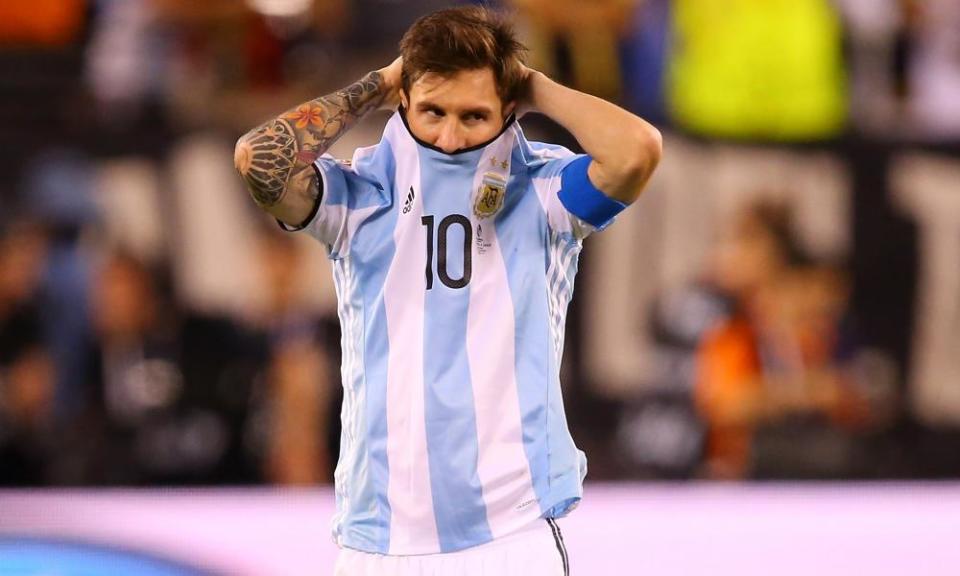Argentina face must-win game against Chile with problems on and off the pitch | Jonathan Wilson

Whatever happens on Thursday, Chile will haunt this generation of Argentinian players for ever. The two sides met in the 2015 Copa América final and the 2016 Copa América Centenario final and on both occasions Chile won on penalties after a 0-0 draw, extending the Argentinian trophy drought that stretches back to 1993. As Argentina face the possibility of failing to qualify for a World Cup for the first time since 1970, Chile, who have a knack of stopping them from playing, are probably the last team they want to be facing.
In truth this is not a crisis; not yet – at the moment Argentina would face a play-off against New Zealand or Tahiti to get to Russia, while the two teams above them are within a point – but there is anxiety. As La Nación pointed out this week, even under Diego Maradona it was never this bad. Back then, they also had 19 points from 12 games – and had just been humiliated 6-1 in Bolivia – but at least they remained fourth in the group. And that really is the worry – this time there are six decent sides in South America and one of Argentina, Chile, Ecuador and Colombia (or perhaps Uruguay) will miss out.
“If we win the three remaining home games, we’ll be at the World Cup,” said Edgardo Bauza, whose six qualifiers in charge have yielded eight points. He is probably right, and Argentina do still have a struggling Venezuela and an inconsistent Peru left to play at home, but given they lost against Paraguay in Córdoba last October nothing can be taken for granted.
All the familiar problems of a dependence on Lionel Messi and trying to accommodate a glut of attacking players remain, but they pale beside the greater issues of Argentinian football that have prompted profound economic uncertainty and led to a players’ strike that delayed the restart of the domestic season by more than a month.
The problems were sparked when the government of Mauricio Macri, who was elected to the presidency in 2015, decided to end the Fútbol Para Todos (FPT) programme instituted by his predecessor, Cristina Kirchner. FPT had essentially been an enormous government subsidy for football, begun in 2009 when the broadcast rights were forcibly bought from the satellite company TSC, the main trigger being the need to get money quickly to the clubs to head off a threatened strike by players who had not been paid.
For Kirchner it was a populist move – astonishingly, she described the practice of screening live games on subscription channels while holding highlights back for a free-to-air programme on a Sunday evening as “kidnapping goals”, overtly likening it to the disappearances perpetrated by the junta that seized power in 1976 – and had the added benefit of hitting at her main opponent in the media, Grupo Clarín, which part‑owns TSC.
And, as Jorge Luis Borges and Adolfo Bioy Casares pointed out in their 1967 short story Esse est Percipi, so long as football is going on, “mankind is at home, sitting back with ease, attentive to the screen or the sportscaster”, happily distracted from political reality.
Macri inherited an economic crisis, with inflation at more than 30%, currency controls maintaining the peso at an artificially high level, the country in technical default following a long‑running dispute with US hedge funds and a national debt running at 48% of GDP. He is essentially neo-liberal and has sought to reintegrate Argentina into the world economy, lifting currency controls and reducing tariffs, which had the effect of devaluing the peso by around 30%. He is also pursuing a programme of austerity, which has led to numerous public sector job losses as unemployment has increased to 8.5%. In such circumstances, maintaining a state subsidy for football is untenable.
On 24 February, with agreement on a final payment of 350m pesos (£18m), it was announced that FPT would cease. But the financial problems that had initially led to its introduction have not gone away. Most clubs are still reckless with their spending and some are corrupt. In protest at wages that were still unpaid, the players’ union declared a strike, delaying the restart of the season after the summer break from 5 February to 10 March. The Argentinian Football Association is considering bids to broadcast the 2017‑18 season but whoever wins the rights it is certain the deal will be considerably less lucrative than FPT.
The AFA, which has no great record of competence, is particularly rudderless at the moment, having been overseen by a Fifa normalisation committee since last June. It took over after Luis Segura, who had been in temporary control following the death of Julio Grondona, was charged with “aggravated fraud” over the distribution of television rights. Segura had stood in an election against Marcelo Tinelli the previous October, only for the 75 delegates somehow to produce a 38-38 draw. If certain players have come to seem disaffected with the governing body, it is hardly surprising.
None of which makes Bauza’s job any easier – and nor does the fact that a round of league games is scheduled for this weekend, between Argentina’s qualifiers against Chile and Bolivia. His predecessor, Gerardo Martino, eventually got sick of all the background noise.
Bauza fights on, pragmatism to the fore. “Beating Chile is fundamental,” he said. “I don’t care how we win but we have to win.”
If they don’t, there really will be a crisis.

 Yahoo Sport
Yahoo Sport 





































